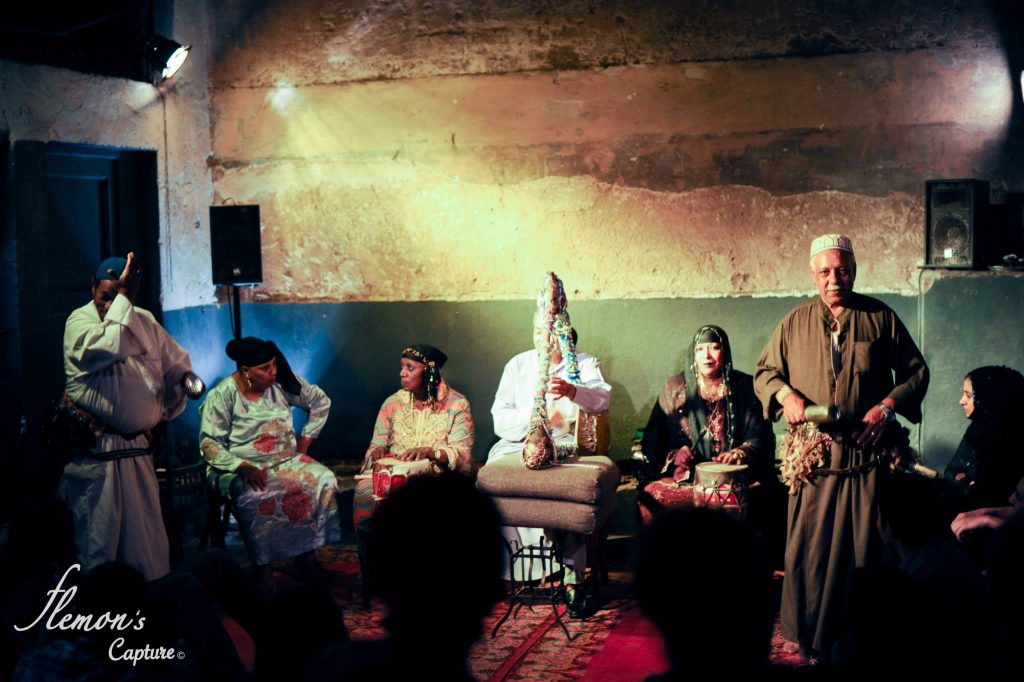Throughout Egyptian musical history, Egyptian Zar music has historically been the only musical tradition in Egypt in which women hold the most important roles in the ensemble’s performance.
Hajer El Hadidi, author of the book “Zar” (2016), defined the genre as a complex healing ritual that is practiced in areas around the Gulf and the Red Sea.
At its core, the word ‘Zar’ can also be interpreted as any form of evil spirit or jinn that possesses an individual troubling them with diseases or problems; it could also reverse the effects of evil spirits into good.
At its core, Zar originally included rituals which required the performer, who is referred to as sheikh or sheikha, to sacrifice an animal for the spirit of the possessed person. However, this idea has changed over the years as many zars now opt out of the animal sacrifice.
“One of the main reasons that Zar is performed is because they [the general public] think the person has been possessed by a bad spirit. So, they perform the Zar [the ritual] to get out the bad spirits and to get the person back to normal,” says Alexandra Gazis, adjunct faculty of psychology at The American University in Cairo, in an interview.
According to Gazis, Zar is one of the few practices labeled as a culture-bound syndrome. The latter is a type of illness or a combination of symptoms that are recognized or occur in a certain culture. Also, since Zar involves several unusual body and hand movements accompanied by several screams, most Egyptians judge a Zar practitioner or attendee to be “mentally ill” or “bizarre”.
“Zar is one of the few that has culture-bound syndromes that we used to have in the DSM IV (Diagnostic and Statistical Manual of Mental Disorders). Psychologists have discovered in several cultures they [the zar practitioners] have this kind of a ritual or something that they do or symptoms that imitates one of the disorders,” says Gazis.
“People have moved on from the traditional way of making Zar and made it more accessible and public through music,” says Umm Sameh, musician and leader of the popular Zar ensemble Mazaher, in an interview.
Mazaher, composed of female musicians Umm Hassan, Umm Sameh and Nour El Sabah, is among the last remaining Zar practitioners in Egypt where women have leading roles. The group has rose in popularity over the years and mainly performs in Makan, in downtown Cairo.
According to Sameh, the rituals originated in Ethiopia and influenced areas around southern Egypt and Sudan.

El Hadidy also added that many of the Zar practices in Egypt were recorded as far back as the early 1900s.
“When Ethiopian slaves were brought here to [Egypt] through ships, many of the women were doing these complex rituals and practices to calm their agonized spirit,” explained Sameh.
This practice was spread throughout Egypt. However, because many people believed it to be a cult-practice, the Egyptian government condemned it to be illegal in the early 20th century. But it continues to be performed, especially in the southern region.
The Zar ensemble is typically made up of male and female musicians. The instruments used are percussive, such as finger cymbals, tambourine, different types of drums, one woodwind instrument, the flute and the harp.
Female musicians usually dance in a trance-like routine that is expressed through the progressive harsh beating of the drums.
Other than dancing, female musicians cry, sing and shout to express how their feelings.
“Whenever the drums begin to escalate, you can’t help yourself but get up and dance. Your body feels the music,” said Sameh.
El Hadidy also added that the sheikha of the ensemble is typically a woman who either performs or oversees the performance and the audience’s response.
According to Gazis, the ritual is divided into three parts: the beginning, the middle and the end.
“The sheikha starts by saying verses of the Quran, lighting incense, saying certain dua’as (prayers) and then things begin to escalate gradually. They keep the person who they want to purify and make them feel better or heal in the middle and they keep rotating around them,” said Gazis.
Screaming and crying, the person in the middle supposedly expels their evil spirits. At the near end, their screams begin to slow down, as well as the movements of the Zar practitioner.
“The role of the female performer in the ensemble is that she comes to the stage and takes out all her feelings through the performance,” said Sameh.
In that way, male and female audience members could somehow relate to her agony, which would cause them to feel calm or sedated.

According to Sameh, the reason why women are preferably picked to perform in the lead is because they “go through a lot in their day-to-day basis.”
In the eyes of the Zar practitioners, this renders women naturally vulnerable and makes the performance a place for them to take out all their concerns. It is a cathartic experience for the everyday woman in Egypt, no matter here identity is.
“A woman is weak. She gets tired quickly, her mentality weakens quickly. She cries a lot when she’s sad. It’s in a woman’s nature to be weak, but a man is supposed to be strong at all times. Because of that, women make a better performance,” said Sameh.
Umm Hassan, Umm Sameh and Nour El Sabah perform the spell-binding Zar by stomping furiously their feet against the floor and slapping the tambourine with increasing vitality. The dialect is not often understood as it is true to the zar’s mix heritage and history.
They chant and sing about women to women; there is an element of vulnerability in their voices but overall, with such a vigorous performance on their shoulders, it is hard to think of these women as anything but weak.






Comments (2)
[…] skydiving over the Pyramids, drift above Luxor in a hot air balloon at sunrise, or catch a live Zar performance in Downtown Cairo, a hypnotic blend of rhythm and ritual that traces back centuries. Traditionally […]
[…] https://egyptianstreets.com/2018/10/13/tapping-into-spirits-and-celebrating-women-egyptian-zar/ […]